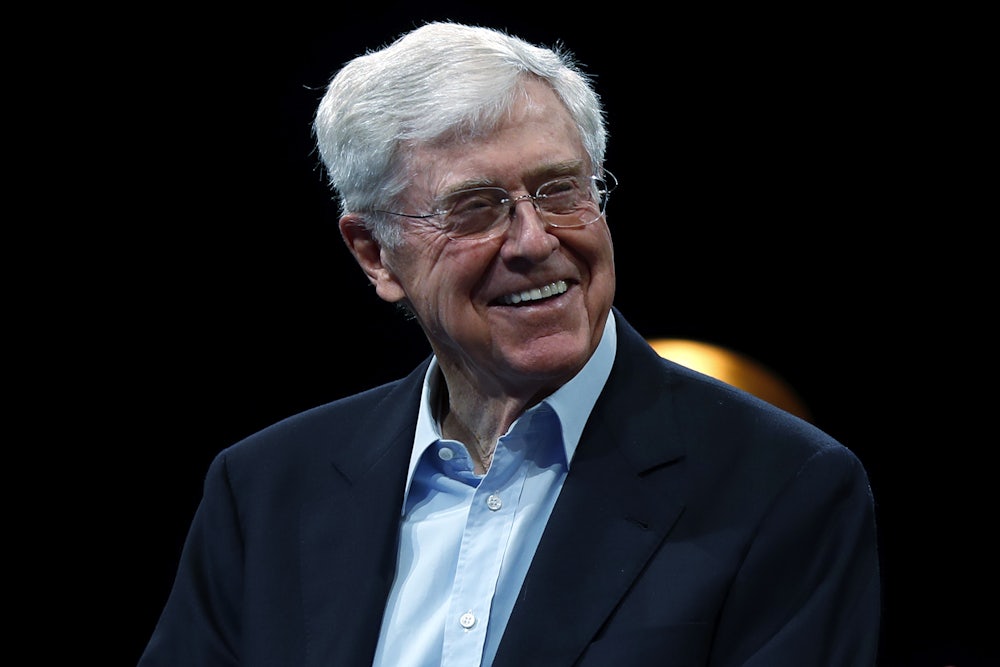Billionaire Charles Koch—who, alongside his late brother, is best known for funding a host of conservative and libertarian think tanks, donating lavishly to Republicans, and otherwise flooding the political system with dark money—recently spoke to The Wall Street Journal in order to express some regret over a few of his past political activities (and promote a forthcoming book, as one does). He was, he told the Journal, now steering away from hard-line partisanship and hoping to work with the Biden administration and other Democrats on issues of apparent shared concern, including criminal justice reform, immigration, and Covid-19. “Unite a diversity of people behind a common goal,” Koch said. “That’s our approach today.” (According to the Journal, he was even more remorseful about his past partisanship in his book: “Boy, did we screw up!” he wrote. Oops!)
Koch’s transformation from a notorious bankroller of conservative causes to a more genteel sort of nonpartisan libertarian has been in the works since at least last year, when the infamous Seminar Network (also known unofficially as the Koch network) underwent a rebrand to become Stand Together. The pleasantly neutral-sounding philanthropic venture backs inoffensive initiatives like job-training and other programs intended to foster “self-actualization” (and happens to be headed by a former director of the free-market think tank the Mercatus Center).
Over the last few years, Koch has also worked with the American Civil Liberties Union and both Democratic and Republican politicians to pass criminal justice reform measures like reducing sentences for nonviolent offenses.
In a certain sense, we’re probably better off with Koch money going toward such efforts than, say, installing Tea Party members in Congress or denying climate change. But at the same time, for all his recent talk of bipartisan “bottom-up” transformation, Koch’s embrace of “unity” barely scratches the surface of the profoundly anti-democratic system that his money helped entrench for decades. And “unity” often means next to nothing within a political landscape whose horizons have already been shrunken down by—surprise!—Koch’s own ruthless interference. He’s a billionaire who’s gotten everything he wants from our political system. Now, I guess, he’d like to be remembered for something else.
But his legacy is already clear. Take, for instance, the Koch brothers’ long-running efforts to fight campaign finance reform. They not only benefited spectacularly from 2010’s Citizens United ruling—which gave them the necessary leeway to fund various dark money groups—but have also poured vast sums of money into fighting campaign finance reform itself, including contributing to a number of legal battles to open the political system to undisclosed donors and unlimited campaign spending. In other words, they’ve worked rapaciously to mold the political system to suit their aims, even if those aims now appear to be changing slightly. “The Koch brothers have been very strategically thinking about how best to shape politics over decades and at the same time they were amassing a fortune that would power whatever strategy they devised,” the Center for Responsive Politics’ Sheila Krumholz told The New York Times last year after the death of David Koch.
Even the Kochs’ interest in criminal justice reform, which emerged as one of their signature bipartisan “unity” causes over the last several years, has often been murky enough that advocates have worried that it could dovetail with their well-known affinity for privatization. (One can imagine, perhaps, letting a few people out of prison only to shuffle them through “reentry services” owned by for-profit entities.) And at the very least, Koch bipartisanship to date appears only to mean dedicating some money to researching prison reform while simultaneously spending $40 million to back and run promotion for Trump’s 2017 tax cuts. The Koch worldview, even as it may narrowly rebrand on some issues, is still the dystopian winner-take-all vision that has long animated its funding.
The problem, then, isn’t simply which horses a newly contrite Charles Koch chooses to back, but the extent to which his extreme wealth and his commitment to a system that enshrines the power of the rich has shaped the entire racetrack. Without serious campaign finance reform to mitigate the kind of political inequality that allows him to wield disproportionate influence over elections, all of Koch’s recent talk of “unity” is a mirage, at best. And rather predictably, his nonpartisan interests don’t appear to include removing money from politics; when The Wall Street Journal asked him about it, he simply said, “Instead of limiting certain people’s ability to engage, we should do all we can to empower more people to get engaged.” (How convenient that political engagement post–Citizens United works out mostly for the rich.) If Koch now regrets aligning himself almost exclusively with Republicans, it’s also the case that the Koch-funded group Americans for Prosperity helped tip the scales for Trump in a handful of swing states as recently as 2016. What’s to say he won’t change his mind again about his political priorities in another four years?
Over the weekend, when asked on MSNBC about Koch’s recent pledge of unity, Bernie Sanders—depressingly still one of the few national politicians who’s consistently rejected big money—called for Koch both to rescind his support for Citizens United and to direct his riches toward supporting economic, environmental, and social justice initiatives. “That’s an important way that he can undo the very serious damage that he did to this country,” Sanders said. I agree but would add that the simplest solution for Koch’s obscene wealth—and one that’s still antithetical to his very project, no matter what other political interests he’s picked up along the way—is probably a government that will relieve him of some of it. Somehow, I don’t think that’s part of the rebrand.
